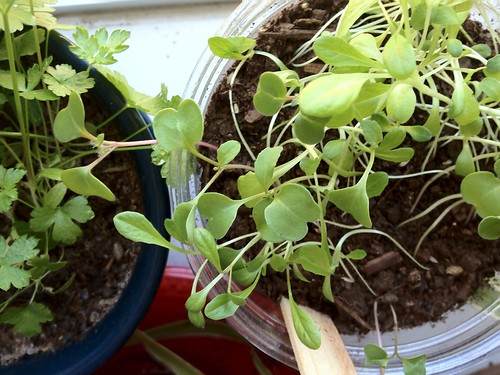Our windowsill gardening experiment lasted a mere three
months this winter, but in that time we learned a few things. Some of our plants grew strong and hearty, and
others fizzled. As amateur gardeners, we
didn’t expect everything to work perfectly, but I think experience has taught
us a few lessons.
1. Some plants will thrive, with or without your best
efforts.
Our parsley plant is the prime example of this lesson. We
abandoned it when it was barely sprouted (we forgot to take it home over Christmas
break!), and it survived. It is thriving
now, and I hope that it continues to do well in the future. I take no credit for its health.
Our green onions, which I wrote about here, did
great in the windowsill and were basically effortless to grow. Again, I don’t
feel like this is any sort of spectacular green thumb of mine, but rather a plant doing
what plants do.
2. Some plants will utterly fail, even with your best
efforts.
Our chives basically failed to germinate until last week. I think this
was because I followed the package directions to sow the seeds on the surface
of the dirt, when they need a little cover to keep them wet enough to
germinate. We had a similar issue with the tom thumb lettuce. Those two, however, I think we can chalk up to
experience.
Our cilantro is another story. It was one of the first
things we planted, with the parsley, but it didn’t survive abandonment. We
re-planted, barely got one sprout (about a month later), and that sprout
quickly died. We tried again with new seeds, which are germinating decently. It
might take us a while to get cilantro growing well for us!
3. If at first you don’t succeed, try again.
See lesson 2 – each time something failed, we tried
again. Usually, we adjusted our approach. Usually, it seems to have helped. We've planted cilantro three times - maybe this time it will stick around.
A corollary to this lesson is that you must be flexible.
Things won’t necessarily work as you planned, or as you want them to. Accept
that fact, and do the best you can with what you have.
4. Small space = small yield. Therefore, herbs are a great choice.
We tried growing some lettuces too, and some micro greens
and sprouts. The micro greens worked
alright, but I think we would need to use a much larger container to make them
worthwhile in the future. Sprouts were fun, but I didn’t really keep up with
them. They were enough to top things with, but we barely grew a salad’s worth
altogether. I don’t think we got our money’s worth out of these things, but we
might have if I committed to containers with a larger surface area.
Although the parsley was the only herb we really got to
take off, it has worked well. Because we only use a few tablespoons at a time,
the plant can keep up with our demand quite easily. And financially speaking,
fresh herbs can really get expensive at the grocery store, so growing your own can
actually save you money. Plus, I find freshly picked herbs are the tastiest.
5. Keep it simple.
Stick to things you know you will use often, and focus
your space and energy on a few plants. You don’t need to grow the whole produce
section at the grocery store. I’d also advise not growing things you don’t eat
a lot – I don’t eat tons of salads in winter, and I didn’t find many uses for
my sprouts other than mixing them into salads.
Next year, I’m thinking some herbs, and maybe microgreens – but that’s a big
maybe. Our windowsill gardening future might be all about the herbs. And that’s
fine – it’s simply what we use.
6. Don’t start in January!
I think windowsill gardening will work much better in the
future if we start around, say, October, and the plants get some real sun
before toughing it out through the darkest months. If we go into the winter
with more mature plants, I think we’ll both have an easier time of it and see a
better return.
There are still some issues that I haven’t figured
out. We had some problems with things
growing very “leggy” (long and scraggly), and I think that was partially due to
the fact that our windowsill wasn’t super-sunny. With the weak winter sun and
short days, the plants simply didn’t get enough light. We added a UV bulb, and
that helped quite a bit. But some things, like the tom thumb lettuce, grew very
leggy anyways. It’s an issue I’m hoping to read up on so I can address it in
the future.
Now that things are warming up, we’re looking forward to
starting our outdoor container garden! Next week, I’ll be talking all about our
plans for that, including our containers, space, seeds, soil, budget, and
progress so far.
Like what you read? Subscribe to the feed in your favorite feed reader, or follow me on Twitter to keep up with new posts!
Like what you read? Subscribe to the feed in your favorite feed reader, or follow me on Twitter to keep up with new posts!








No comments:
Post a Comment